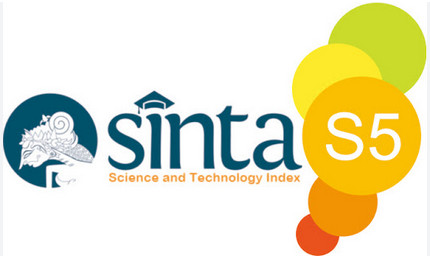Pengaruh Kepemilikan Institusional dan Profitabilitas terhadap Audit Delay
(Studi pada Perusahaan Teknologi di BEI tahun 2020-2022)
Abstract
This research aims to determine the negative influence between institutional ownership and profitability on audit delays in technology companies listed on the Indonesian stock exchange in 2020-2022. So that the delivery of company financial reports will no longer occur delays or delays. The research has a population of 44 technology companies listed on the Indonesian Stock Exchange in 2020-2022 with a total sample of 21 companies obtained from the purposive sampling method then multiplied by 3 periods to become 63 samples of technology companies that will be analyzed. The research method uses quantitative with a causal associative explanation level with SEM-PLS data analysis using Smart PLS 3.0 software. The results of this research are that the institutional ownership variable has no influence on audit delay in technology companies listed on the Indonesian Stock Exchange in 2020-2022. Meanwhile, the profitability variable has a negative influence on audit delay in technology companies listed on the Indonesian Stock Exchange in 2020-2022.
References
[2] F. Sandria, “Deretan Skandal Lapkeu di Pasar Saham RI, Indofarma-Hanson,” CNBC Indonesia, 2021. https://www.cnbcindonesia.com.
[3] L. D. S. Astuti, K. A. Supitriyani, and E. Susanti, Analisis laporan Keuangan. Bandung: Media Sains Indonesia, 2021.
[4] Merdianto Budi Utomo and Aristha Purwanthari Sawitri, “Pengaruh KAP Big Four, Komite Audit Dan Kepemilikan Institusional Terhadap Audit Delay,” Maj. Ekon., vol. 26, no. 1, pp. 90–94, 2021, doi: 10.36456/majeko.vol26.no1.a3957.
[5] S. A. Dwiyani, I. D. N. Badera, and I. P. Sudana, “Faktor-Faktor yang Mempengaruhi Ketepatwaktuan Penyajian Laporan Keuangan,” E-Jurnal Ekon. dan Bisnis Univ. Udayana, vol. 6, no. 4, pp. 1451–1480, 2017.
[6] L. W. Kristiana and D. Annisa, “Pengaruh Kepemilikan Institusional, Auditor Switching, dan Financial Distress Terhadap Audit Delay (Studi Empiris pada Perusahaan Sektor Pertambangan yang Terdaftar di Bursa Efek Indonesia Tahun 2018-2020,” J. Revenue J. Ilm. Akunt., vol. 3, no. 1, pp. 267–278, 2022, doi: 10.46306/rev.v3i1.118.
[7] F. Siswanto and S. Suhartono, “Pengaruh Kepemilikan Institusional, Reputasi Kantor Akuntan Publik, Spesialisasi Industri Auditor, Profitabilitas, dan Ukuran Perusahaan Terhadap Audit Delay (Studi Empiris di Perusahaan Consumer Goods yang Terdaftar Di Bursa Efek Indonesia Periode 2018-2,” J. Akunt., vol. 16, no. 2, pp. 192–218, 2022, doi: 10.25170/jak.v16i2.1313.
[8] E. Siswanto, Manajemen Keuangan Dasar, 1st ed. Malang: Universitas Negeri Malang, 2021.
[9] A. Hayat et al., Manajemen Keuangan 1, 1st ed. Medan: Madenatera, 2021.
[10] D. E. Zebriyanti and A. Subarjo, “Faktor-Faktor Yang Berpengaruh Terhadap Audit Delay Pada Perusahaan Liquid 45,” J. Ilmu dan Ris. Akunt., vol. 5, no. 1, pp. 1–24, 2016.
[11] L. Gozali and K. Harjanto, “Pengaruh Profitabilitas, Ukuran Perusahaan, Kepemilikan Institusional dan Solvabilitas Terhadap Audit Delay (Studi Empiris Pada Perusahaan Manufaktur Yang Terdaftar Di Bursa Efek Indonesia Periode 2015-2018),” Ultim. Account., vol. 12, no. 2, pp. 214–230, 2020.
[12] R. A. Sebriwahyuni and B. Kurniawan, “Analisis Pengaruh Struktur Kepemilikan dan Pertumbuhan Perusahaan terhadap Keterlambatan Audit,” Glob. Financ. Account. J., vol. 4, no. 1, pp. 29–37, 2020.
[13] V. W. Sujarweni, Metodologi Penelitian Bisnis & Ekonomi. Yogyakarta: Pustaka Baru Press, 2020.
[14] Sugiyono, Metode Penelitian Bisnis Penelitian Kuantitatif, Kualitatif, dan R&D. Bandung: Alfabeta, 2017.
[15] S. Haryono, METODE SEM Untuk Penelitian Manajemen AMOS LISREL PLS. Bekasi, Jawa Barat: PT. Intermedia Personalia Utama, 2016.
[16] R. Wulaningrum, L. Patabang, and O. H. Simatupang, “Pengaruh Profitabilitas, Ukuran Perusahaan, dan Kepemilikan Institusional Terhadap Audit Delay,” Semin. Nas. Terap. Ris. Inov. Ke-8, vol. 8, no. 2, pp. 138–145, 2022.













